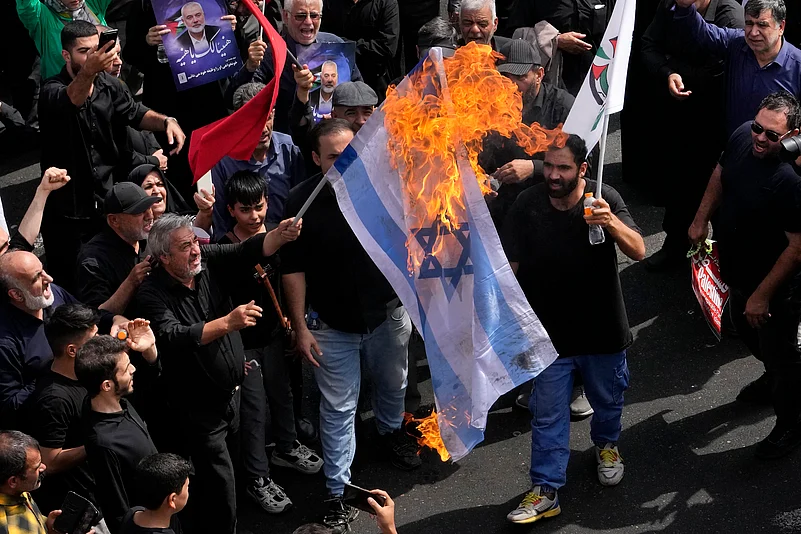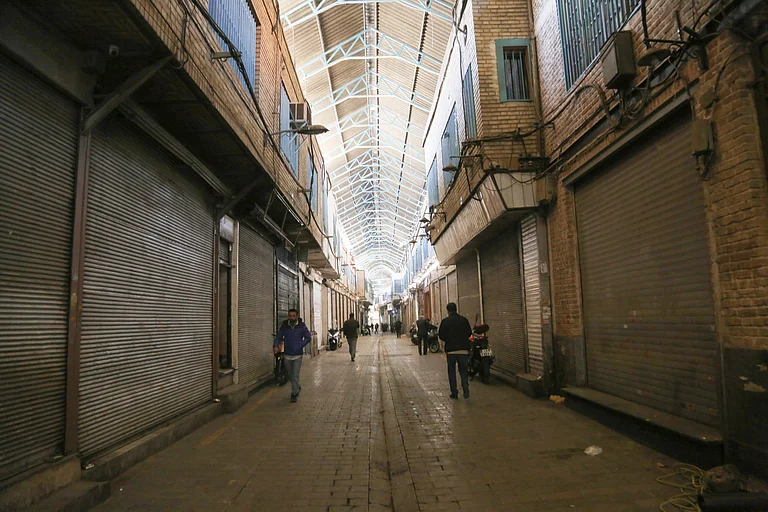Hamas leader Ismail Haniyeh’s assassination on July 31 in Tehran, where he was attending the inauguration ceremony of Iranian President Masoud Pezeshkian, is the latest escalation in the 10-month-old Israel-Hamas war. Though, Israel did not take official responsibility, both Hamas and Iran have blamed Israel for the killing and have vowed retaliation.
Israel has been waging the war with the declared goals of “crushing and destroying” Hamas’ military capabilities, ensuring that it is not able to present a threat in the future. It has also engaged in a sustained campaign of targeted killings to eliminate the organisational side of not only Hamas but also Hezbollah and the commanders of Iran’s Islamic Revolutionary Guard Corps (IRGC) present in Syria and Lebanon, comprising the core of the Iranian-backed ‘axis-of-resistance’.
Apart from seeking to jeopardise the recent progress in hostages-for-ceasefire deal with Hamas and reformist Pezeshkian’s nascent diplomatic overtures to the West, the killing of Haniyeh on Iranian soil seeks to reinforce Israel's, or rather Prime Minister Benjamin Netanyahu’s, meta narrative of Israel being in a direct and existential struggle with Iran.
In late July, Netanyahu was in Washington to cement the US bipartisan diplomatic and military support for Israel which has been crucial for Israel’s war on Gaza. His speech to the joint session of the Congress was dedicated to portraying Iran as the biggest threat to not only Israel but the United States.
He started with an appeal to shared values and identity and the imagery of a moral conflict familiar to his American audience, saying that the two countries are together in this clash between ‘civilisation and barbarism’. The objective was to put Iran and its allies beyond the pale of humanity, thus undeserving of any reasoned and proportionate response let alone diplomacy.
In terms of geopolitics, Netanyahu argued that it was Israel that was standing in the way of Iran's drive to challenge America and conquer the Middle East through use of its many proxies from Hamas to Hezbollah and Houthis. Against what he described as Iran’s ‘axis-of-terror’ confronting America, he sought the US support for creating an ‘anti-Iranian Abraham Alliance’ between Israel and Washington’s Arab allies.
Jonathan Leslie in his book ‘Fear and Insecurity: Israel and the Iran Threat Narrative’ meticulously analyses how Israeli political leaders, especially Benjamin Netanyahu as the country’s longest serving Prime Minister, have strategically cultivated and disseminated a threat narrative of a ‘nuclear’ and ‘radical Islamic’ Iran posing an existential threat to the Jewish state.
Domestically, Israeli citizens’ fear and insecurity centred on Iran has led Netanyahu to build a support base around his image as “Mr Security”. Netanyahu projected his leadership of the country as necessary for fighting the Iranian threat and to realise the vision of a greater Israel encompassing the biblical kingdoms of Judea and Samaria, namely the West Bank.
In terms of foreign policy and security strategy, the Iranian threat has been used to justify Israel’s refusal to engage with the Palestinians by accusing them of being one of Iran’s many proxies, sabotage US-Iran diplomacy, especially the nuclear agreement with Iran. This has been done to keep US committed to the Middle East and to rebalance regional geopolitics by making a common cause with Arab states against Iran as their shared enemy, thus marginalising the importance of the Palestinian cause as a pan-Arab issue.
Given the power disparity between Iran and the United States and its regional allies which joined the ‘maximum pressure’ against Iran, Tehran has pushed back through its ‘forward defence’ strategy of confronting threats and enemies as far away as possible from Iranian borders. Deterrence through proxies has afforded Iran the ability to strike against its enemies and also a plausible deniability crucial for reducing the risk of direct response by the other side, which could lead to escalation into a full-blown conflict.
Since the October 7 Hamas attack, Israel has intensified its grey-zone attacks targeting the IRGC commanders in Syria and Lebanon with the objective of raising costs for the IRGC to operate in the area around Israel, while ensuring that Iran is not able to evade responsibility for attacks against Israel through proxies.
In response, Iran has also recalibrated its deterrence posture. Nearly two weeks after Israel attacked the Iranian consulate in Damascus, Iran launched aerial attack against Israel, which were largely intercepted by air defences of Israel, Jordan and the Gulf States.
Subsequently, Major General Hossein Salami, the Commander-in-Chief of the IRGC, noted that Iran’s retaliatory strikes have established a new equation with Israel that from now on if Israel attacks Iranian interests, figures and citizens anywhere, the IRGC will retaliate. Iran’s Supreme Leader Khamenei stated that the primary issue was not the number of missiles or drones launched, but demonstrating the emergence of the willpower of the Iranian people and the Armed Forces on the global stage.
In this context, Haniyeh’s killing in Tehran once again erodes Iranian deterrence signalling that Israel is inching closer to a direct attack on Iran. Apart from the timing, the ambiguity surrounding the manner of the killing – whether it was a pre-planned intelligence operation exposing Iran’s intelligence failure or a missile launched from outside the compound where Haniyeh was staying – was aimed at embarrassing Iran in front of its allies in the Axis of Resistance. Iranian leaders and military commanders have insisted that the Axis of Resistance will carry out a decisive retaliation against Israel and that the decision cannot be swayed by mediation efforts of countries fearing a regional war.
As Iran contemplates retaliation, it has an interest in maintaining détente with its Gulf neighbours, especially Saudi Arabia and the United Arab Emirates. Any display of Iranian missile power adds to their threat perception and given their role in intercepting Iranian missiles earlier, the effectiveness of Iran’s retaliation will require their understanding. The coming days will tell whether Iran can manage to thread the needle by carrying out a retaliation to deter further escalation from Israel or if it will trigger an out-of-control conflict spiral.
Dr Deepika Saraswat is Associate Fellow at the West Asia Centre of the Manohar Parrikar Institute for Defence Studies and Analyses
(Views expressed are personal)






















